“I respectfully request a moratorium on Holocaust films,” writes Stewart Klawans on the Jewish culture site, Nextbook. “By continually replaying and reframing and reinventing the past, these movies are starting to cloud the very history they claim to commemorate. Call it the law of diminishing returns — or call it a paradox that mirrors the Torah’s famously self-contradictory commandment at the end of Parshat Ki Tetze, concerning the people who were the prototype of Nazi Germany: ‘Thou shalt blot out the remembrance of Amalek from under heaven; thou shalt not forget.’ Very soon, with Holocaust movies, we’ll need to forget if we want to remember.”
Month: December 2008
Scoot
Running into town for afternoon screenings of Seven Pounds and The Day The Earth Stood Still. Back around 5 pm eastern. Probably.
The Whacking
Speaking to L.A. Times/”Big Picture” columnist Patrick Goldstein about the firing of piece-of-work Twilight helmer Catherine Hardwicke from shooting the upcoming sequels. Summit honcho Rob Friedman yesterday insisted that the first follow-up, titled New Moon , was not being rushed into production.
“We love the draft [that Melissa Rosenberg] turned in,” he says. “Melissa has worked very hard on the material and was an integral part of what made the original film such a success. This is not a rush job. The movie only gets released when it’s finished. I’d like it to be next year, but we’re not going to put out a bad movie to hit a release date.”
“On the other hand, Summit can’t dawdle,” Goldstein writes. “Unlike with Harry Potter, whose characters aged with each book, the characters in the “Twilight” series remain young forever, so if the studio is going to rely on its newly-minted stars, Kristen Stewart and Rob Pattinson, to carry the entire series, it has to move full speed ahead. Summit has options on its lead actors, but since they are now in demand for other films, if Summit doesn’t press ahead quickly, it could lose them for months on end to other productions.
“Hardwicke’s abrupt departure has also fueled rumors that she clashed with the all-male hierarchy at Summit. It’s a charge often leveled at Hollywood’s largely all-male executive ranks, which has a woeful track record of hiring female filmmakers on mainstream studio projects. Friedman insists there were no gender issues .
“‘It’s an insult to me personally as well as to our company. I’m the father of four daughters. When I was at Paramount, we did Kathryn Bigelow ‘s K-19: The Widowmaker. I was the person who marketed Mimi Leder‘s Deep Impact [often cited as one of the most commercially successful films directed by a woman]. Here at Summit, one of the first films we’ve bought was The Hurt Locker, which is also directed by Kathryn Bigelow. We would definitely make another film with Catherine Hardwicke, just not the sequel to Twilight
Goldstein’s best passage in the piece, to wit: “Summit’s handling of Hardwicke’s departure is more reminiscent of what Universal did with its Bourne series, which was also in the hands of a prickly indie filmmaker.
“Doug Liman launched the franchise with his dazzling The Bourne Identity, but he went way over schedule and drove the studio crazy with his improvisational perfectionism. Even though the movie was a big hit and seemed to carry Liman’s personal stamp, the studio ditched him, bringing in Paul Greengrass, a filmmaker with equally indie-minded credentials who could better deal with the deadlines and demands of a studio environment.”
BFCA Noms Blank Road, Thomas
The great Revolutionary Road was blanked entirely in this morning’s nominations for the 14th Annual BFCA Critics Choice Awards, including a denial of Kate Winslet‘s fully deserved Best Actress nomination. BFCA, your middle name is shame. This is a manifestation of the “it’s too gloomy” sentiment that deep-and-heavy-soul types have been muttering all along.
Milk and The Curious Case of Benjamin Button did best with eight nominations apiece. But where’s Kristin Scott Thomas‘s Best Actress nomination for I’ve Loved You So Long? This is ridiculous. Who are these Shallow Sallys and Quarter-Inch-Deep Williams doing the voting?
The positive-surprise standouts were Best Actress and Best Supporting Actress noms, respectively, for Nothing But The Truth‘s Kate Beckinsale and Vera Farmiga; the negative-shocker standout is the omission of Revolutionary Road‘s Michael Shannon for Best Supporting Actor — a performance that is universally acknowledged as totally killer. Shannon is the baby who got thrown out with the anti-Road bathwater.
The too-abundant-and-therefore-close-to-meaningless Best Picture nominations contain no surprises.
The 10 Best Picture noms went to Changeling (a worthy film but not interesting or masterful enough to truly be called one of the year’s best), The Dark Knight (fine), The Curious Case of Benjamin Button (okay), Frost/Nixon (default over-50 fave for reasons of efficiency, brevity, quality of performances), Milk (fine), The Reader (a too-generous call — tasteful, well-rendered pic doesn’t deliver emotionally); Slumdog Millionaire (naturally), WALL*E (of course) and The Wrestler (boldly cast downbeat grit, but I have doubts about those metal-staple and delicatessen sliced-hand scenes, which are clearly intended to make viewers flinch and recoil and moan).
The awards will be handed out in Los Angeles on Thursday, 1.8.09, at 9 pm. The show will air on VH1.
The Best Actor nominees are Gran Torino‘s Clint Eastwood (yes!), The Visitor‘s Richard Jenkins (certainly), Frost/Nixon‘s Frank Langella (of course), Milk‘s Sean Penn (yup) and The Curious Case of Benjamin Button‘s Brad Pitt (I loved Pitt in Burn After Reading, but his Button thing is at best passively stirring — the sponge-man thing doesn’t deliver much in the way of arcs or turns), and The Wrestler‘s Mickey Rourke (a given).
The Best Actress nominees are Nothing But The Truth‘s Beckinsale (hooray, Kate! — I’ve been pushing her all along), Benjamin Button‘s Cate Blanchett (take away the de-aging CG and Jack Crabbe old-woman makeup and you’re left with a fine but less-than-breathtaking performance), Rachel Getting Married‘s Anne Hathaway (natch), Changeling‘s Angelina Jolie (very good work but a bit of a perplexing character — why did she accept the replacement kid in the first place?), Frozen River‘s Melissa Leo (naturally) and Doubt‘s Meryl Streep.
The Best Supporting Actor noms went to Milk‘s Josh Brolin (good work!), Tropic Thunder‘s Robert Downey, Jr.(inspired), Doubt‘s Phillip Seymour Hoffman (first-rate), The Dark Knight‘s Heath Ledger (the best) and Milk‘s James Franco (a good man delivering a fine perf).
The Best Supporting Actress noms went to Vicky Cristina Barcelona‘s Penelope Cruz, Doubt‘s Viola Davis, Nothing But The Truth‘s Farmiga, Benjamin Button‘s Taraji P. Henson (who’s fine, but she had a much better role in Hustle & Flow), The Wrestler‘s Marisa Tomei and The Reader‘s Kate Winslet.
Friends of Torino #1
“Clint Eastwood is America’s great humanist director at present, making eloquent calls for compassion in films like Million Dollar Baby, Letters From Iwo Jima and this year’s Changeling, but never at the expense of spinning a good yarn.
“Gran Torino is a plea for racial tolerance but also a compelling story of friendship which lingers in the mind when the extravagances of Benjamin Button and Australia have faded from memory.
“As with Eastwood’s other recent films, the film is ultimately a tearjerker with a momentously moving finale. As Clint’s own gravelly voice starts up over the end credits singing the mournful title song, it’s genuinely sad to think we might not see him act again, but somehow fitting that he should bow out with Walt Kowalski.” — Screen International‘s Mike Goodridge, writing from London.
Queen of the Flops
Earlier today the Guardian‘s David Thomson, a longtime admirer and recent biographer of Nicole Kidman, asked if Ms. Frozen Forehead is “becoming box-office poison.” Becoming?
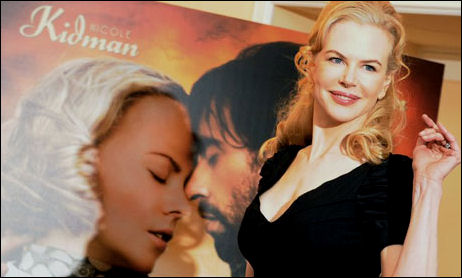
Sliced Hand
“The best sequence in The Wrestler, even more likely to lodge in your mind than the soaring sadness of the climax, takes place not on the wrestlers’ canvas, with its carpet of blood and broken glass, but at the deli counter of the supermarket,” writes New Yorker critic Anthony Lane in the current issue.
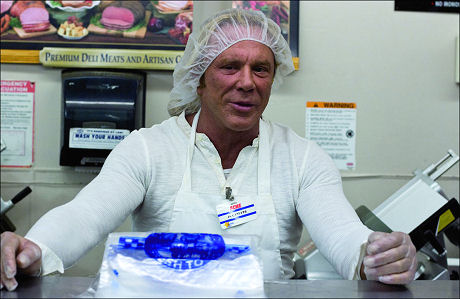
Mickey Rourke in The Wrestler
“Here Randy (Mickey Rourke), needing the money, dons a protective hairnet and doles out pasta salad. He even pins on a name tag that says ‘Robin,’ randiness being too rich for this clientele. The dent to his pride is profound, more wounding than any professional blow to the head, and the scene closes in agony, as he takes out his frustration on a meat slicer.
“But here’s the thing: while the job lasts, he’s pretty good at it, bringing a brief shaft of pleasure to the customers, and suffering any taunts that come his way. What Rourke offers us, in short, is not just a comeback performance but something much rarer: a rounded, raddled portrait of a good man. Suddenly, there it is again — the charm, the anxious modesty, the never-distant hint of wrath, the teen-age smiles, and all the other virtues of a winner.
“No wonder people warmed to Randy Robinson twenty years ago. I felt the same about Mickey Rourke, and I still do.”
Slumdog Push-Back?
“Though Slumdog Millionaire has a hoary plot device, the kind of narrative armature that could have come out of the vaults of Warner Brothers five decades ago, the ability of Danny Boyle to find both the movie and the humanity in that story make it a tough Oscar competitor,” says N.Y. Times Oscar guy David Carr, a.k.a., “the Bagger.”
“[Still], the more Slumdog Millionaire rolls, the harder the push-back will get. Nothing is writ. And it won’t be long before we start hearing, ‘Sure, it was a darling movie, a surprise really, but that third act? Please.'”
That’s exactly the opposite view I have of Slumdog Millionaire. It’s a buzz-kick movie but also a rough one to get through because of all the cruelty and violence visited upon the lead character (played in his adult years by Dev Patel) in the first and second acts. It’s hard, it’s a chore, but then along comes that third act and the film starts to sing. The third act saves it, and the train-station finale knocks it out of the park .
No-Shows
Boston Herald critic Jim Verniere informs that the Boston Film Critics will vote this coming Sunday, and yet he can’t get get his hands on a screener for Steven Soderbergh‘s Che, or one for Rod Lurie‘s Nothing But The Truth. If I were IFC I would have rented a room and have a big Che screening for the whole Boston gang.
Update: IFC, I’m told, “did send the Boston Film Critics screeners by priority mail,” and that its mailing house “did send a copy to Verniere a while ago.” They are nonetheless “overnighting him a new screener today,” I’m told. “These things happen but it is not on purpose.”
I Finish Things
No offense, but the people who’ve been slamming Gran Torino have their heads up their posterior cavities. Or maybe just broomsticks. They sure don’t seem to understand the legend and the mythology of director-star Clint Eastwood, which is what this film is mainly about (apart from the sections having to do with love, caring, guilt, moral growth and father-son relations). But to watch and fail to get this thing is to admit to a failing — a void — in your own moviegoing heart. Anyone who mocks this film, I mock them back double.
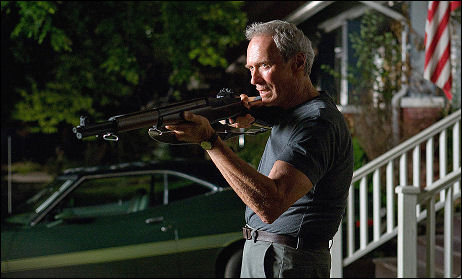
Set in a lower middle-class Detroit neighborhood, Gran Torino is a plain, straight, unpretentious…okay, a tiny bit hokey-here-and-there racial-relations drama by way of an older conservative sensibility — Clint’s, obviously, but also, it seemed to me, John McCain‘s. Get off my lawn, etc. McCain needs to see it and review it for the Huffington Post — seriously. That would be perfect.
It’s an old-fashioned film in that the pacing is gradual and methodical in a good 1962 way, but primarily this is a clean, disciplined, older-guy’s urban western — a kind of growly, sardonic, at times lightly comedic racial-relationship drama. But also a sad and fatalistic Shane movie about a morally compromised guy facing down the baddies at the finale. Light and darkish, brusque and kindly, spitting up blood. Old-guy angst, doubt, warmth, uncertainty, fear-of-death, fear-of-life, family– the whole magillah. What’s to dislike?
Popcorn-wise, this is a doddering Dirty Harry vs. evil-ass gangbangers conflict piece, except it takes its time getting to the Big Showdown parts and there aren’t that many of them to begin with. Like Shane, GT keeps the guns holstered and makes every shot count.
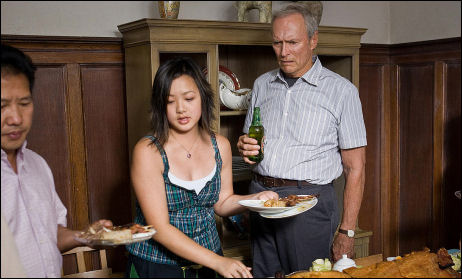
But the confrontation scenes in this vein are awfully damn satisfying because we’re watching the same old Harry, a little weathered but just as fierce as he was nearly 40 years ago, standing up and refusing to take any shit from any cheap-ass punks. But at the same time Walt Kowalski — i.e., Clint’s character — is the kind of guy who’s always letting slight little shafts of light in as he deals with and talks to others. The kind of light, I mean, that comes in odd underhanded ways. Blunt honesty, kindliness, vulnerability, consideration, and tender-gruff father-son conversations, etc. Tough sentiment, but not sentimentality.
Either you get and cherish the Clint thing, or you don’t get and cherish the Clint thing. There’s no third way. Either you understand that he makes films that sound a certain way, share a certain pictorial signature, are cut a certain way and unfold at a certain pace — the same way Unforgiven, Million Dollar Baby, Letters From Iwo Jima, The Bridges of Madison County and all the rest of them played, looked and unfolded — or you don’t understand that.
I understand that. I got it. I admired it. Gran Torino knows itself, is true to itself. And there’s nothing the least bit embarassing or short-fally or Razzie about it. Not in the least. David Poland, hang your head.
Under-30s are advised to stay away. Seriously — you’ll just be wasting your time. Especially younger women. But over 35, over 40 and especially over 50 types are welcome. Guys who’ve been around for the long Clint ride and know what it’s always been about I’ve seen it twice now and GT is about as good as this sort of thing can get. You just have to know what “this sort of thing” really and truly means — the deep-down content and perimeters of it, I mean.
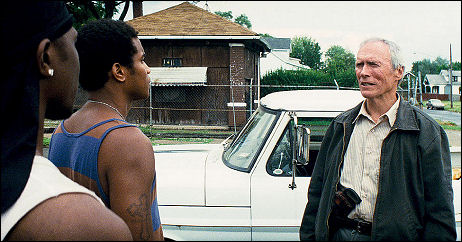
I’ll get into this film again tomorrow, most likely. The other actors, the jokes, the warmth moments — there’s a lot that’s rich and rewarding in this film.
Is Clint’s performance likely to draw a Best Actor nomination? Most likely, yeah. Partly a gold-watch thing, partly for the acting itself. The current inside his acting is quite strong, his whole life running through it. It’ll feel weird if a nomination doesn’t happen — put it that way.
Won’t Come
I came upon Doubt costar Phillip Seymour Hoffman around 9:40 pm as I was leaving the premiere party at the Metropolitan Club, and a question suddenly hit me that I thought he might know the answer to.
“Philly, what’s the name of Bennett’s new movie?,” I asked. “The one he’s working on now, gonna shoot early next year…something?” I meant Bennett Miller , who directed Hoffman four years ago in his Oscar-winning performance in ’05’s Capote.
“Uhhmm,” Hoffman said, knowing what I meant but drawing a blank. “It’s some kind of darkish romantic thing, some kind of relationship drama,” I prompted. “Uhhm, yeah, it’s…not coming to me,” Hoffman said, shrugging. “Okay, two of us,” I said. Be well, see ya, happy holidays.
The reason we couldn’t remember Bennett’s film is because it’s called Foxcatcher, and what the hell does that mean? Something about a hound, a lady-killer? But doesn’t that sound overly literal? Not to mention anachronistic with that seeming reference to women as foxes? If it’s nothing like this then what’s the allusion or metaphor? A person who literally catches foxes in the forest? Naaah. Too D.H. Lawrentian.
We all get Dogcatcher, but Foxcatcher? Doesn’t feel right.
I’m just saying your film has to have a title that’s easy to remember, one that Average popcorn-munching Joes can make an easy connection with. You sure don’t want one of your pallies having trouble thinking of it. That says a little something, I think. A word to the wise.
